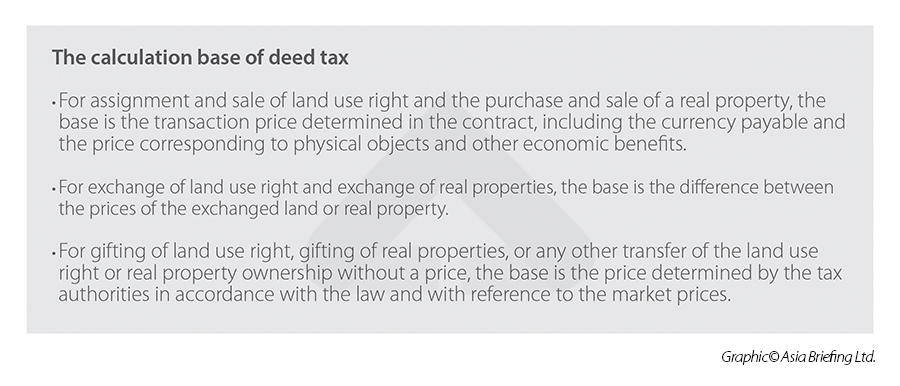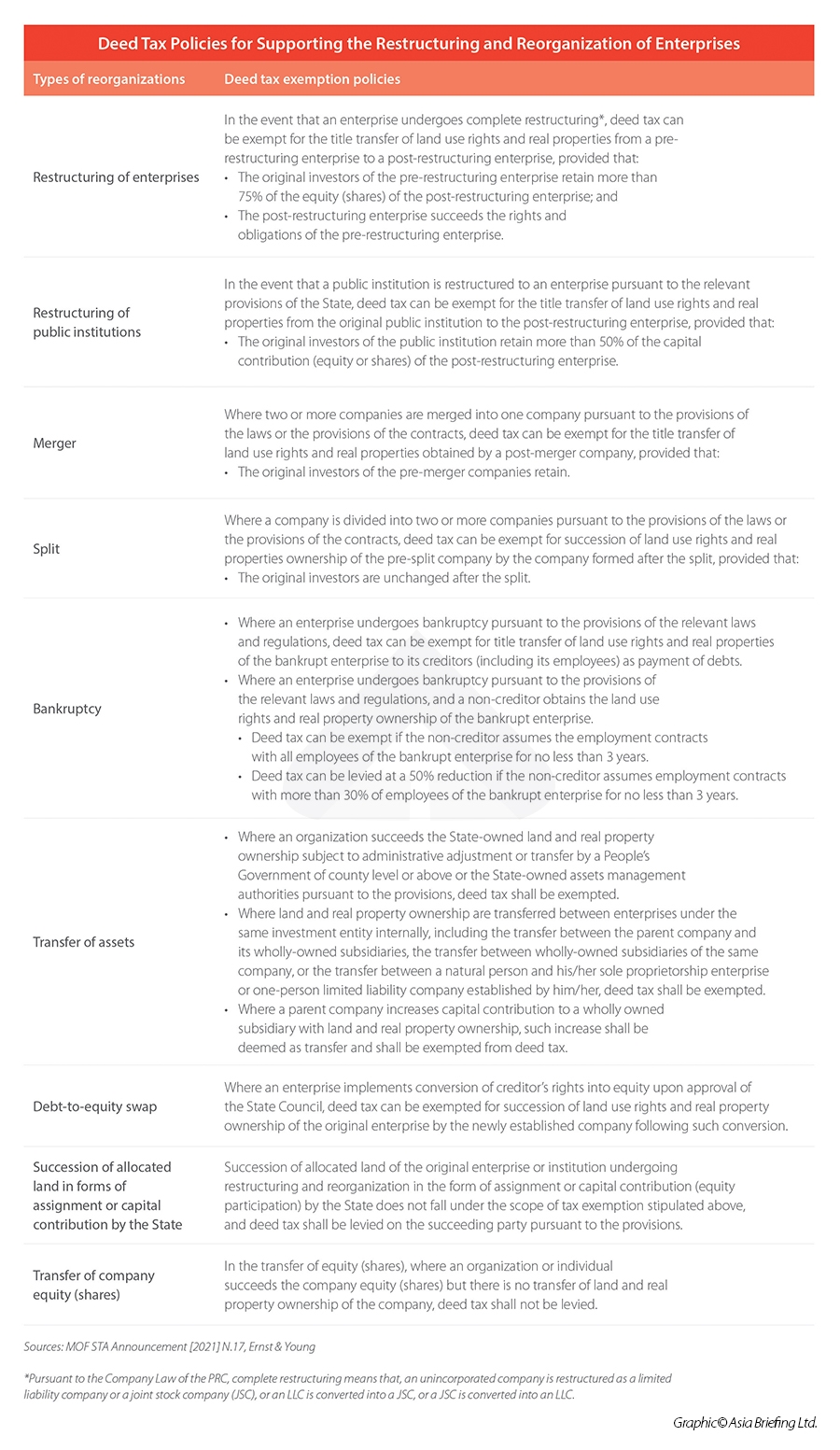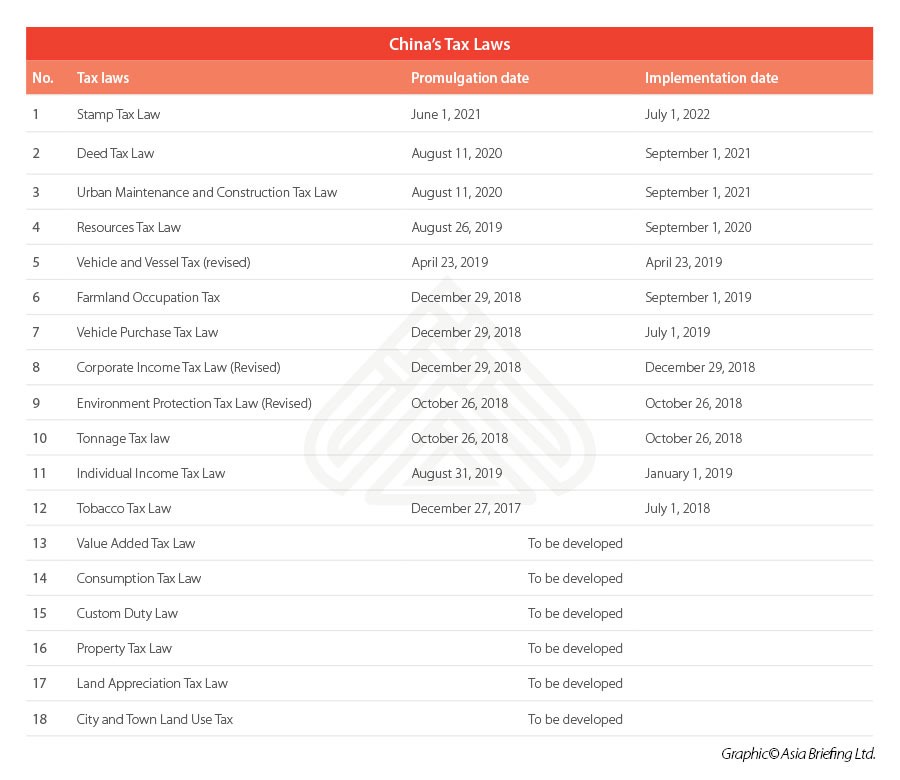China’s new document tax law is due to come into effect on September 1, 2021. Foreign corporations are subject to deed tax when acquiring land and / or land use rights in China, and this often occurs when the business is restructured. Fortunately, China has extended the deed tax exemption to support certain types of corporate restructuring and reorganization.
On August 11, 2020, China announced the adoption of the document tax regulation into national law. The new law on document tax comes into effect on. in force September 1, 2021which repeals the provisional ordinance on real estate transfer tax issued in 1997.
Property tax is a tax levied on assignees of land use rights and real estate. For companies, it is often true that there are companies Restructuring and reorganization (including merger, division, asset transfer, etc.).
China granted certificate exemptions for the qualifying restructuring and reorganization of companies and public institutions. The exemption regulations extended to December 31, 2020 were extended to December 31, 2023.
What is document tax?
Under the Deed Tax Act, any organization or person to whom ownership of land use rights or real estate has been transferred within Chinese territory is required to pay deed tax.
The acquirer bears the tax liability in one of the following three scenarios:
- Acquisition of granted land use rights from the state;
- Transfer of granted land use rights (“Land Use Rights”), either through sale, exchange or donation – with the exception of the transfer of land contract administration rights (“Land contract administration rights”) and land administration rights (“Land administration rights”); or
- Buying and selling, swapping or donating real estate on the property.
In the case of transfer of ownership of the land use rights or real estate by way of conversion into capital investment (participation), debt repayment, allocation, reward and the like, the property tax is also levied in accordance with the statutory provisions.
How is property tax calculated?
China’s crime tax rates range from three to five percent. The new law provides that local governments can choose a specific tariff within the aforementioned range.
Below we have compiled the regional property tax rates that have been updated and confirmed by some provincial and local governments.
China’s tax rates for deeds
Formula for calculating the amount of property tax to be paid
The amount of property tax to be paid = the tax base × the applicable tax rate

What changes are there in the Land Transfer Tax Act?
Compared to the existing transitional regulations on real estate transfer tax, the new real estate tax law has clarified the principles of real estate transfer tax in the transfer of ownership of land use rights and real estate in the form of conversion into investments (participation), debt repayment, allocation and reward.
In addition, the new law broadens the scope of what can be exempt from property transfer tax, including:
- Exemption of non-profit schools, medical institutions and social institutions from the real estate transfer tax if they use land or premises for office space, teaching, health care, scientific research, care for the elderly or aid purposes.
- Exemption from real estate transfer tax for the use of the barren mountains, land or beaches acquired for agricultural, forestry, livestock or fishery production.
- Exemption from deed tax for changes of ownership of land use rights or real estate between husband and wife during marriage.
- Exemption from real estate transfer tax for the inheritance of land use rights and property by legal heirs.
- Exemption from deed tax for the acquisition of ownership of land use rights and real estate by foreign embassies, consulates and representations of international organizations in China.
In addition, the law expressly obliges the tax authorities and their employees to treat the personal data of taxpayers confidentially in the context of tax collection and administration.
Property Tax Exemption Guidelines for Corporate Restructuring and Reorganization
In support of certain types of corporate restructuring and reorganization, the Ministry of Finance (MOF) and State Tax Administration (STA) on 26th Institutions (MOF published STA announcement [2021] N.17), which applies retrospectively from January 1, 2021 to December 31, 2023.
In the following table we have arranged the types of corporate restructuring and rehabilitation and the conditions under which the transfer of ownership of land use rights and real estate can be exempt from real estate transfer tax. 
In simple terms, the transfer tax for the inheritance of property and the transfer of land use rights and real estate in the event of full corporate restructuring, public institution restructuring, mergers and divisions, transfers in the context of bankruptcy proceedings, transfers of assets between companies with common owners and approved debt-to-equity swaps, if the transfer meets certain conditions.
The inheritance of land use rights, which were originally granted to the rehabilitated companies or public institutions through assignment or state capital contribution, does not, however, come under the exemption.
In addition, in the course of corporate restructuring and reorganization, companies may be exposed to taxes other than property transfer tax, including property value tax, value added tax, corporate income tax and Stamp duty.
For more information on taxes in China’s corporate restructuring and reorganization, please contact our tax experts at [email protected].
Larger background: Law-based tax administration
In 2015 the STA published the guidelines for the comprehensive promotion of lawful taxation (Shui Zong Fa [2015] No. 32), which states that China will accelerate the process of revising relevant tax regulations into legal form in order to improve the security of tax policy, strengthen the authority of tax documents and ensure the efficiency of tax administrations. This is an important part of China’s broader rule of law effort, that is, law-based governance of the country. Businesses are well advised to keep a close eye on future developments in Chinese tax laws as they relate to the way in which they will pay taxes in China.
China’s tax laws

about us
China Briefing is written and produced by Dezan Shira & staff. The practice supports foreign investors in China and has done so since 1992 through offices in Beijing, Tianjin, Dalian, Qingdao, Shanghai, Hangzhou, Ningbo, Suzhou, Guangzhou, Dongguan, Zhongshan, Shenzhen and Hong Kong. Please contact the company for assistance in China at [email protected].
Dezan Shira & Associates has offices in Vietnam, Indonesia, Singapore, United States, Germany, Italy, India, and Russia, in addition to our trade research facilities along the Belt & Road Initiative. We also have partner firms that attract foreign investors to The Phillipines, Malaysia,Thailand, Bangladesh.